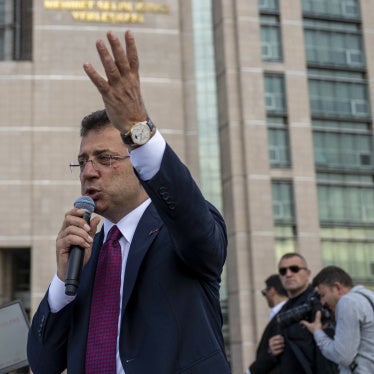(Santiago) - The arrest in London one year ago [October 16] of Chile's former military ruler has rekindled hopes for justice for his victims.
A new report released today by Human Rights Watch finds that the arrest of former dictator Augusto Pinochet has dramatically changed the judicial landscape in Chile, forcing Chileans to deal more openly with matters too long swept under the rug. "The recent developments in the courts signify very important progress in human rights in Chile that were never dreamed of before Pinochet's arrest," said José Miguel Vivanco, executive director of the Americas division of Human Rights Watch.
Dire forecasts of political turmoil and instability have not been born out. "The apocalypse so widely predicted to occur in Chile unless Pinochet were freed has not come about," added Vivanco. "Indeed, Chilean democracy has benefited from Pinochet's prosecution."
London police arrested Pinochet, Chile's military ruler from 1973 to 1990, on October 16, 1998, at the request of Spanish magistrate Baltasar Garzón, whose indictment against Pinochet included genocide, murder, and torture of thousands. Further developments have narrowed the offenses ruled extraditable to torture and conspiracy to commit torture after December 1988. The judge ordering Pinochet's extradition last week included psycological torture suffered by relatives of the disappeared as an offense that could eventually be tried before Spanish courts.
As Chile prepares for presidential elections in December 1999, the Pinochet arrest has prompted debate about the human rights legacy of the military. The crisis has also highlighted the undemocratic aspects of the constitution which Chile inherited from Pinochet.
In the 53-page report, "When Tyrants Tremble: The Pinochet Case," Human Rights Watch describes encouraging developments in Chilean courts during the year since Pinochet's arrest. Before Pinochet's arrest, the courts stifled most prosecutions of human rights violations from the military government through application of a 1978 amnesty law.
However, the Supreme Court of Chile recently allowed prosecutions in "disappearance" cases to proceed, despite the amnesty, on the grounds that such cases are continuing crimes. Courts have charged several high-ranking military officers in "disappearance" cases over the past year. A Chilean judge investigating more than forty criminal complaints against General Pinochet is preparing to send him a list of questions he is obliged to answer. "While the amnesty law still obstructs justice, the courts are finally taking responsibility for cases that fall outside its scope," said Vivanco.
Representatives of the armed forces are participating along with human rights lawyers in talks promoted by the Chilean Minister of Defense that are aimed at providing long-concealed information about the fate of more than 1,000 people who "disappeared" under Pinochet's rule. Defense Minister Edmundo Pérez Yoma has given assurances that the talks would respect the autonomy of the courts, a vital condition for their legitimacy.
Human Rights Watch has applauded Spain's effort to prosecute General Pinochet for crimes against humanity and Britain's cooperation. The Spanish and British actions have set vital precedents establishing the personal criminal responsibility of former heads of state for atrocities committed under their rule.
Human Rights Watch urges Chile to:
- Ensure that the amnesty law is not used to close prosecutions of gross violations of human rights;
- Reform the system of military justice to restrict its jurisdiction to properly military offenses;
- Enable civilian judges or officials to carry out investigations on military premises without impediment;
- End the representation of the armed forces on the Supreme Court;
and cooperate with the Spanish court investigating the case against Pinochet.






